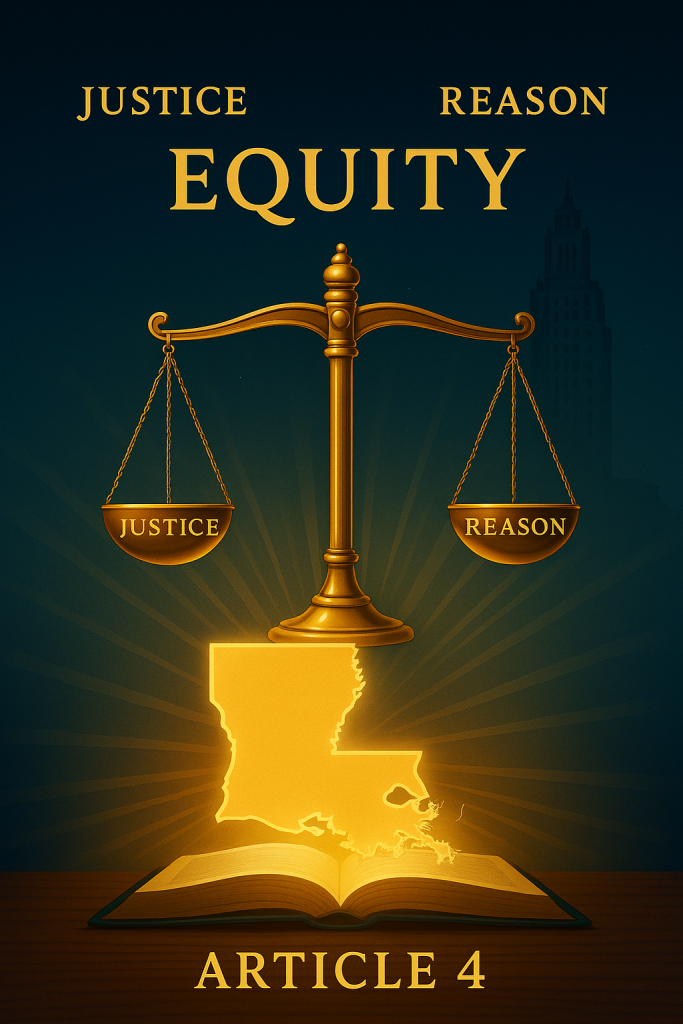 When the Law Is Silent
When the Law Is Silent
Have you ever wondered what happens when no written law or legal tradition clearly applies to a situation in Louisiana? Our state’s legal system is rooted in the Civil Code, which doesn’t just define laws — it also provides guidance for what courts must do when neither legislation nor custom offers an answer.
That’s where Louisiana Civil Code Article 4 comes in. It ensures that justice doesn’t stop just because no statute or precedent exists. Instead, it calls on courts to decide according to equity, using principles of justice, reason, and prevailing usages.
The Law Itself: Article 4 of the Louisiana Civil Code
Art. 4. Absence of legislation or custom
When no rule for a particular situation can be derived from legislation or custom, the court is bound to proceed according to equity. To decide equitably, resort is made to justice, reason, and prevailing usages.
This article is short, but it’s one of the most powerful statements in Louisiana’s entire Civil Code. It gives courts the authority — and the duty — to ensure fairness even in the absence of a written rule.
Breaking It Down: What Article 4 Really Means
1. “When no rule… can be derived from legislation or custom”
Louisiana’s Civil Law tradition prioritizes legislation and custom as the main sources of law (see Civil Code Article 1). But sometimes, gaps exist — new technologies, unforeseen circumstances, or entirely novel disputes that the legislature never addressed.
When no statute or long-standing custom provides an answer, the courts must still act.
2. “The court is bound to proceed according to equity”
This phrase means the court must decide — it cannot refuse to rule simply because no law applies. The guiding principle becomes equity, a concept grounded in fairness and moral reasoning.
3. “Resort is made to justice, reason, and prevailing usages”
When relying on equity, judges turn to the broader principles that underpin our legal system:
-
Justice: What outcome would be fair and just for all parties?
-
Reason: What is logical and consistent with sound judgment?
-
Prevailing usages: What do accepted practices or norms suggest in similar contexts?
Together, these factors help courts render decisions that align with the spirit — even if not the letter — of Louisiana law.
Equity in Action: How Article 4 Works in Practice
Article 4 ensures that no case goes unanswered. For instance, if a new type of digital property dispute arises that isn’t covered by existing legislation or custom, a Louisiana judge can still decide the matter equitably — guided by justice, logic, and contemporary norms.
This approach keeps the legal system flexible, fair, and responsive to change while maintaining consistency with Louisiana’s civil law foundations.
Why This Matters to You
Understanding Article 4 is important because it:
-
Guarantees access to justice — courts must decide every case, even when the law is silent.
-
Prevents legal dead ends — ensures fairness by applying reason and equity where legislation doesn’t reach.
-
Demonstrates Louisiana’s uniqueness — our Civil Code explicitly embraces equity as a legitimate, formal source of judgment.
In short, Article 4 protects you by ensuring that fairness always has a place in Louisiana’s courts — even when the law hasn’t caught up yet.
Need Legal Guidance?
If you’re facing a situation where the law seems unclear, you don’t have to navigate it alone. The Berniard Law Firm can help you understand how Louisiana’s Civil Code — including Article 4 — applies to your unique circumstances.
📞 Contact us today for experienced guidance rooted in Louisiana’s strong civil law tradition.
Other Berniard Law Firm Articles on Civil Code: Legislation vs. Custom: Unpacking the Foundations of Louisiana Law
and Video Surveillance Clears Dollar General: No Liability Without Proof of a Hazard
 Louisiana Personal Injury Lawyer Blog
Louisiana Personal Injury Lawyer Blog

